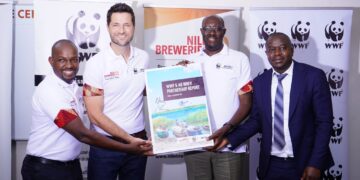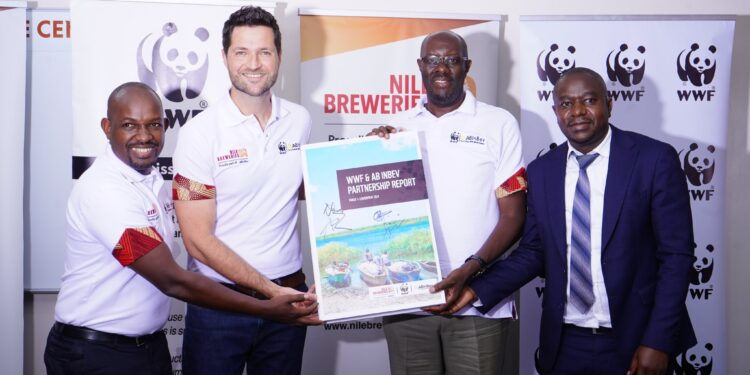Nile Breweries Limited (NBL) and World Wildlife Fund for Nature (WWF) Uganda have successfully restored 27 Kilometers of R. Rwizi to address water security in Western Uganda.
River Rwizi and its catchment cover an estimated 8200 km2 spanning over twelve districts in Western Uganda.
The river provides water and related environmental services to approximately 2.5 million people in South Western Uganda, representing approximately 4.5% of the population of Uganda.
Despite this, the catchment areas have been heavily degraded resulting in occasional water shortages during the dry season and flash flooding during the wet seasons.
In his remarks, Ivan Tumuhimbise, WWF Uganda Country Director, noted that by integrating the best available knowledge and involving local communities, governments and other stakeholders, they are laying solid foundations to create lasting and impactful change.
He explained that with the work done around River Rwizi, they have measurably improved water availability, water quality and freshwater biodiversity.
He added, “We are catalyzing key decision makers to recognize the value of water and improve water governance to enable solutions to address water availability and quality challenges.”
On his part, Adu Rando, NBL Managing Director, noted that the communities and economies in the region are being impacted by the reduced ability of the river and its catchment to absorb and recover from risks such as flash floods and a lack of vegetation in the catchment areas.
“Our goal is to have 100% of our communities in high-stress areas show measurable improvement in water availability and quality.” noted Adu.
He added, “By rehabilitating the catchment area, we are addressing not only the environmental degradation but also the socio-economic impacts on the communities.”
In the last five years, NBL and WWF have demarcated 270 hectares with 18.3 hectares already restored along a 27km length of the river as well as soil and water conservation actions including native tree planting.
In his remarks, Stephen Emor, the team leader for the Victoria Water Management Project in the Ministry of Water and Environment, said the river has faced a number of degradation challenges that have threatened its sustainability.
He noted that 1,076 households have been mobilized to undertake sustainable land management practices like construction of trenches, to enhance soil fertility, reduce soil erosion and river sedimentation.
Nine rain harvesting systems have also been installed for clean drinking water benefiting 95 households.
By next year, over 5,000 households in six sub-counties in the mid-catchment area of the river are earmarked to benefit from access to clean and safe water.











